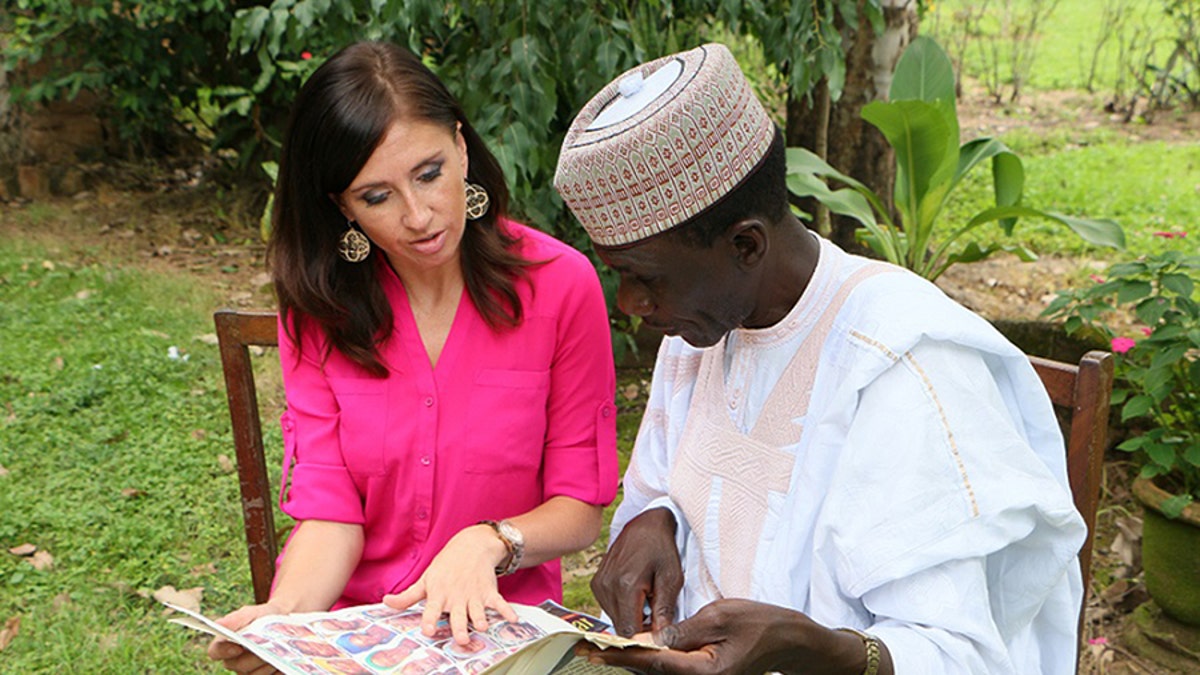
Kristin Wright and Yakubu Nkeki looking through photos of the missing Chibok girls in Jos, Nigeria in September of 2015. (Open Doors USA)
Finally free from captivity at the hands of Boko Haram, one Chibok girl just ran into her father’s arms for the first time in three years.
“When she saw me, she ran and grabbed me and started crying,” said Yakubu Nkeki, whose adopted daughter Maimuna was among the 82 girls freed on May 6, 2017. “I was so overwhelmed.
“Today is a wonderful day,” Nkeki said, adding that he feels “amazing joy” at her return.
I’ll never forget the day that I first met Yakubu Nkeki. Greeted by the warm air and blazing mid-afternoon sun, I stepped off of a plane in Jos, Nigeria, in September of 2015. A short time later, I found myself surrounded by sorrow, as the fathers of the kidnapped girls – nearly 300 of them taken from a school in the northeastern Nigerian town of Chibok -- shared their stories with me.
Working in advocacy with Open Doors, an organization that has helped the families of the Chibok girls, providing practical and spiritual support as well as trauma counseling, I had the unique opportunity to visit with these men, listen to them and cry with them.
That day in 2015, the dry air seemed filled with hopelessness.
Yakubu Nkeki’s eyes brimmed with tears as he described his love for his daughter Maimuna, who was kidnapped by the militant Islamist group Boko Haram in April 2014.
On that day, 17 months into the captivity of the Chibok girls, many of whom were Christian, international media attention was waning. The popular #BringBackOurGirls hashtag that once ignited international activism was a relic of the past. In the aftermath of the media frenzy, the parents of the Chibok girls were plunged deeper into their worst nightmare: their daughters in the hands of Boko Haram; their government seemingly passive in its response; and a world who quickly forgot their plight.
Nkeki and I both wept that day.
We looked through the photos of the missing girls. Nkeki knew the stories of hundreds of them as a leader of the Chibok kidnapped girls parents’ association. For the Chibok parents, he said, the days go by slowly. Every minute is agony. Every parent is wondering: Where is she? Is she alive? What is happening to her?
One of the fathers of the Chibok girls told me that day, “Sometimes I can feel okay, when I am with my family or with my church, but when I am alone, it all comes back.”
At one point he broke down into tears, crying, “I miss her, I miss her, I miss her.”
That day I genuinely wondered: Will this man ever see his daughter again?
A wave of hopelessness washed over me as we embraced. My stomach churned. My heart ached.
Just over a week ago, when I saw the news that 82 Chibok girls had been freed, I was almost too afraid to hope. When I heard that Nkeki had seen Maimuna for the first time, I couldn’t stop crying.
The tears of sorrow we cried in 2015 have turned to tears of joy for Nkeki and his family. It is overwhelmingly good news—the kind that makes you realize that truly anything is possible. I am so happy for Yakubu Nkeki. I am so grateful that Maimuna has a second chance at life after such a horrifying ordeal.
But my heart is still aching for the Chibok girls who remain in captivity, and the thousands of other Nigerian girls and women who have been kidnapped by Boko Haram.
Nkeki’s joy at his daughter’s incredible return should ignite us all with a fierce hope for the ultimate freedom of every Chibok girl—and a determination to act on their behalf.
We can’t stop here. With at least 100 Chibok girls still in captivity and a long road of healing ahead for those who have been freed, we must do all within our power to advocate for them to help ensure they are reunited with their families and that they receive access to crucial trauma counseling and aftercare, as well as continuing education.
We should advocate for all in Nigeria who face severe persecution, urging the United States government to vocally address the ongoing targeting of Christians like many of the Chibok girls and their families, at the hands of Boko Haram. Open Doors USA recently launched a campaign urging President Trump to swiftly appoint an Ambassador at Large for International Religious Freedom, to address religious persecution around the world and seek to heighten action on behalf of those who are suffering.
For every Nigerian girl who is free from Boko Haram, there are hundreds who are still in captivity. They need our prayers, our awareness and our support. They need us to remember when the rest of the world forgets. They need us to speak out in the midst of the silence. Today, let us be grateful for the blessing of Maimuna’s freedom and the embrace she shared with her father after three long years. Let us continue to fight for the freedom of those who are still confined. It is my hope and prayer that someday soon, every Chibok father will have a daughter running back into his arms.
